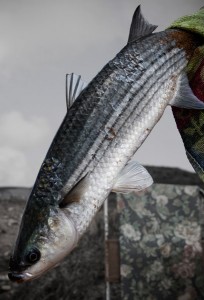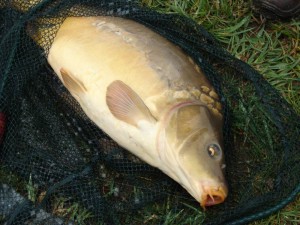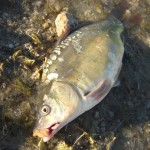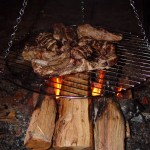How to Clean a Fish When Camping
 This is part two on How to Clean a Fish When Camping. This section mainly covers how to descale, gut and prepare your fish for cooking. If you missed part one on “What You Need to Clean Your Fish” you can read it here.
This is part two on How to Clean a Fish When Camping. This section mainly covers how to descale, gut and prepare your fish for cooking. If you missed part one on “What You Need to Clean Your Fish” you can read it here.
De-Slime Your Fish
It’s important to clean and prepare the fish for cooking shortly after being caught so as to maintain its freshness. First wash off the layer of slime on the fish, if it has one; fresh fish often have this slimy layer when they come out of the water. This fish slime may contain parasites and bacterial growth that could contaminate the flesh of the fish if it were exposed, so make sure to remove this slime before slicing into the fish.
Remove Scales
Next, with the fish scalier or the blunt edge of the dull knife, scrape off the scales by using short strokes against the direction of the scales from tail to head; repeat on other side. Make sure you get the scales around the fins, gills and throat of the fish. Make sure all scales are removed along the fish’s body, and wash in cold fresh water so that all the scales sticking to the sides gets washed away. If you don’t mind scales, you can skip to the next section.
Cleaning Out Your Fish
Make the first cut with the sharp fillet knife by inserting it into the vent in the fish’s belly right in front of the anal fin and slice out forwards towards the gill region, carefully watching your fingers. Split the gills’ central connection. Remove the entrails—intestines, liver, other internal organs—with your fingers. Make sure to scrape out the liver, which attaches to the back bone and the swim bladder – which attaches to the cavity itself. Check the cavity to ensure everything has been removed, because if the “sticky gooey stuff” (membranes or other particles) is left inside and cooked, there will be a horrible bitter taste. You can even grab the section at the base of the head, pinch a little and pull everything out at once. Cut out the gills with your knife, too. Once mostly clean inside, give the insides a rinse and wash out any blood that you can see.
Cooking Your Fish Whole
 Decide whether you want to cook the fish whole or not. Usually small fish are cooked whole, and bigger fish need to be prepared as fillets. If cooking the fish whole, then the head and tail sections need not be removed because a skewer can be “threaded” through the mouth and tail section of the fish to hold the fish above the campfire later when cooking.
Decide whether you want to cook the fish whole or not. Usually small fish are cooked whole, and bigger fish need to be prepared as fillets. If cooking the fish whole, then the head and tail sections need not be removed because a skewer can be “threaded” through the mouth and tail section of the fish to hold the fish above the campfire later when cooking.
Rinse the cavity thoroughly with the bottle of fresh water. If you want, remove the dorsal fin by cutting along each side of it and carefully pulling the fin out with the pliers. Be careful that bones at the base of the fins aren’t left inside the fish. Store the cleaned fish in the container, making sure the cleaned fish faces downward so that water does not pool in the cavity. If your container holds ice, make sure melted ice water does not pool in the cavity so as to prevent bacteria from growing and spoiling your fish, as these organisms live inside the entrails. If your fish happens to have yellow grubs on them when you clean them (such as when cleaning bass), flick them off and press on; these yellow grubs are parasites that don’t hurt humans (according to some state fishing websites) and they can be killed by thorough cooking.
Cooking Your Fish in Fillets
If you prefer having the fish prepared in fillet-fashion, cut just above the fish’s ribs, which you can feel with your knife and use as a guide; pull the fillet away from the fish’s body once the blade reaches the head end. Inspect the fillet for bones, and gently pull the bones out. Separate the skin from the meat with the knife by cutting under the skin and pulling the skin slowly away from the fillet from the front to the back. The skin should be a thin layer with little to no meat on it. Repeat on the other side.
Another way is to open the fish up from the belly with your knife and remove the backbone, ribs, head and tail – leaving just a flat double fillet with the skin on. Remove the fins with deft cuts from your knife, and take care not to get poked because those fins can be sharp and slippery. You can remove the ribs and bones just before removing the backbone by slipping your thumb from just behind the head and drawing down between the meat and the rib cage all the way down the length of the fish.
Nothing Should “Smell Kinda Fishy”
Good fish should never smell fishy. But if there happens to be a smell you don’t like on the fish, you can get rid of this smell by rubbing some cooking salt all over the fish, leave the salt on the fish for a few minutes, then wash it off; this can even bring out the flavor of the fish after cooking. You can even squeeze lemon juice onto the fish before cooking to mask the fishy smell, if you so choose. Properly discard bones and leftover remains of the fish.
To rid your hands of the fishy smell, rub your hands together with the juice squeezed out of half a lemon then wash hands with warm soap and water. When drying your hands, use a rag—not your clothes—to wipe them.
If you missed reading part one “What You Need to Clean Your Fish” you can read it here.
Author: Mariecor Agravante
Edited By: CampTrip.com




I’m so glad I came across your blog! I definitely want to get my young family into camping and this is a great resource. I used to fish all of the time when I lived in Washington state but I had forgotten a lot of stuff like how to clean a fish. Good stuff!
Thank you Jeff for the very kind comments! I hope this article helped to re-fresh or should I say re-fish your memory. I hope that CampTrip will continue to be a useful camping resource for you. Enjoy camping with your family -best of luck!